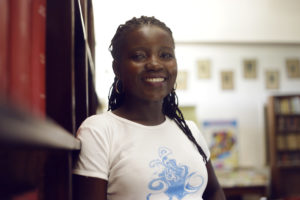
Jambula Tree
When Sylvie and I are six
we eat jambula till our tongues turn indigo
then we travel home with night licking our heels.
In the morning, our foreheads still anointed
in violet blessings, we twine our stick-arms around its branches
and stuff banana fibre dolls in the hollows of its roots.
We swaddle make-believe babies in grass-blankets
and check on them between bouts of hide and seek.
Now we are twenty six, in a cafe on a tree-lined street
we sit over Caesar salad and white wine
and Sylvie raises her ring finger to the sun,
‘These hands wash his boxers.’ And I see
a high priestess in a harem
where wives are judged by how well
they wash skid marks off their husband’s underwear,
by how fervently they pray away the cum from his encounters
with sharp-breasted-round-hipped girls.
Sylvie will elect for C-Section to stay tight,
her baby will feed on a bottle, her breasts will stay
high,
and I, remain
watching her mauve-stained soles, matte black lipstick
that will not bleed. Even after drinks.
Maybe she bleeds in other ways.
“Notice. Lake Kills”
After 26th December, 2015
Rashid, 22,
and his friends
are loping into the lake
as if the water is air,
they are buoyed by a sloe wave,
fingers teasing the tip of a crest,
and we never see them again,
this version of twelve, strappling men, laughing,
gliding into the lake,
how their onyx skin caught the last fires of sun,
how the water embraced them
before they came flopping ashore,
like a shoal of blotted Nile Perch.
their corpses surfaced in 24 hours
defying the 3 day rule. Bodies, bobbed, in death triumph. Dark. Still.
The post mortems said:
no external injuries
no haemorrages
distendended lungs
Dead. End of story.
And we were sucked back into the heaving land
If there had been an owl
My son
died
the death I should have died,
quietly
– he went –
in his sleep.
on that morning
the sun shimmered
like it had showered in gold –
I would have understood
if there had been an owl –
two hoots (one for each year
he breathed).
and no sun –
for the eternity he would die.
About the Author:
 Lillian Akampurira Aujo is a poet and fiction writer based in Kampala, Uganda. She is the winner of the 2015 Jalada Prize for Literature for her story, “Where Pumpkin Leaves Dwell,” and the 2009 Babishai-Niwe Poetry Award for her poem “Soft Tonight.” Her work has been featured online in Prairie Schooner‘s “Shoes” issue, The Revelator Magazine, Bakwa Magazine, Sooo Many Stories, the Bahati Books anthology Your Heart Will Skip a Beat, Jalada’s Afrofuture(s) anthology, Jalada05/Transition123, and Omenana.
Lillian Akampurira Aujo is a poet and fiction writer based in Kampala, Uganda. She is the winner of the 2015 Jalada Prize for Literature for her story, “Where Pumpkin Leaves Dwell,” and the 2009 Babishai-Niwe Poetry Award for her poem “Soft Tonight.” Her work has been featured online in Prairie Schooner‘s “Shoes” issue, The Revelator Magazine, Bakwa Magazine, Sooo Many Stories, the Bahati Books anthology Your Heart Will Skip a Beat, Jalada’s Afrofuture(s) anthology, Jalada05/Transition123, and Omenana.
Her work also appears in print in the Caine Prize 2013 Workshop anthology A Memory This Size; the Femrite anthologies Wondering and Wandering of Hearts, Summoning the Rains, and Talking Tales; and in the Babishai-Niwe publication A Thousand Voices Rising. More of her work is forthcoming in the Kenyan publication Kwani?
Her poetry has been translated to Malayam, and is also set to be taught to Grade 8 students in the Philippines as part of a Contemporary African Poetry class. She has been a mentor in the WritivismAt5 Online Mentoring program. She is a 2017 Fellow of the Ebedi Residency in Iseyin, Nigeria.









Keeping The Bird Alive: A Dialogue with Lillian Akampurira Aujo – Africa in Dialogue December 04, 2020 04:17
[…] was adapted from Monica Arac de Nyeko’s Jambula Tree. And you, of course, have a poem titled Jambula Tree! So let’s hope that that will soon be adapted for […]